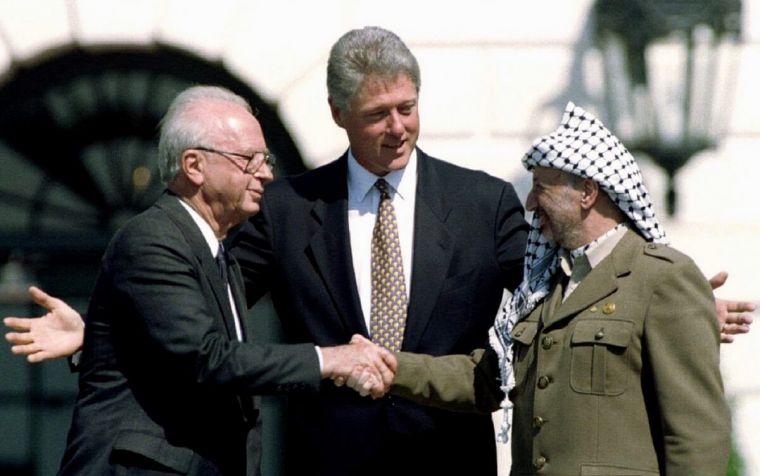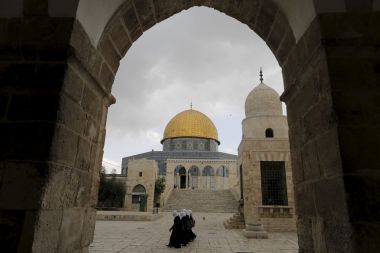What if Rabin hadn't been shot? And other questions...

What if?
It's one of the great questions in life. We can ask ourselves this question in relatively minor matters on an almost daily basis. But it's a powerful question in the big geopolitical questions of our time too.
What if the Iraq War had never happened? Would ISIS now exist? What if someone had pushed the button during the Cuban Missile Crisis? What if the American Civil War had been won by the Confederacy?
In some senses these questions are useless. They take place in a past long gone. We can't change the events that occurred and the decisions which were made. But in another way, they are worth considering. So called 'counterfactuals' are actually important if we are to learn from history and try to forge a way ahead.
One of the most tragic counterfactuals concerns an incident which took place 20 years ago this week. A shot rang out which ranks alongside the most cataclysmic of the 20th Century. The bullets which killed Martin Luther King, John F Kennedy and Archduke Franz Ferdinand had huge consequences. Similarly, the bullet which was fired by Yigal Amir on 4th November 1995 in The Kings of Israel Square in Tel Aviv. It killed the Israeli Prime Minister within the hour. But 20 years later, it's arguable that as well as murdering Yitzhak Rabin, it also killed the prospects for peace in Israel/Palestine for at least a generation.
Rabin had won the Nobel Peace Prize for his willingness to seek a compromise with Palestinian leader Yasser Arafat. In the face of severe criticism from hardliners in Israel he pursued an incredibly difficult path which had by no means secured peace, but had at least given it a chance.
The famous pictures of Arafat and Rabin shaking hands on the White House Lawn under the gaze of Bill Clinton in 1993 had given hope to those on both sides who were desperate to find an agreement to the decades-old conflict. Arafat was reviled in Israel for the role he'd played in supporting armed insurrection against Israelis. Israeli politicians like Rabin and Shimon Peres, the Minister of Foreign Affairs, who took over as Prime Minister, were abhorred in parts of the Palestinian Territories for the role the Israeli Occupation had played in violence towards and oppression of Palestinians.
But the idea that Israelis and Palestinians could talk, and attempt to find a way forward was huge progress. This was due in no small part to the sacrifices and risks taken by Rabin. In the end, it was clear that he had taken the ultimate risk and paid the ultimate price. Killed by a hardline Jewish Israeli extremist, Rabin's life was over, and soon, seemingly was the peace process.
The Second Intifada was not far away. It was far more deadly – with suicide bombing become an almost daily occurrence in Israel – and a bloody crackdown on the Occupied Palestinian territories which has continued to this day as a result.
This week, a series of articles has asked what might have happened, had Rabin not been killed. "Did Rabin assassination kill the best chance for peace?" asked the BBC. "20 Years Later, The Question Lingers: What If Yitzhak Rabin Had Lived?" said NPR. Foreign Policy simply wondered, "What Would Have Happened if Yitzhak Rabin Had Lived?" His old rival and colleague Peres said this week, "I am sure that if he were alive he would have made peace with the Palestinians as well."
So what can we learn from asking 'what if?' I think there's a helpful and an unhelpful way to ask the question. The unhelpful version is full of pessimism. It suggests a golden opportunity has gone and will not return. My conversations with Israelis and Palestinians suggest this isn't an unrealistic assessment of the grim prospects for peace in their troubled Holy Land.
But hope must spring eternal. At the height of the Troubles in the 1970s and 80s in Northern Ireland you'd have been thought crazy for suggesting that 20 years later sworn enemies from either side would sit in government together. Of course Northern Ireland isn't now perfect, but it is a lot more peaceful that Israel/Palestine and the trajectory is towards continuing peace rather than violence.

So we come to the second version of the counterfactual question. This more positive question seeks to glean the wisdom from what could have been. Yes, Rabin's life was cut short by a terrorist. But that needn't necessarily have derailed the peace process. In fact, the increase in illegal settlement building and other hardline measures by the Israeli government was not inevitable. Neither was the deadly Second Intifada which was launched by Palestinians soon after.
Asking 'what if?' in this context helps us to think of what honouring Rabin's legacy might have looked like – what it could still look like. We can also ask 'what if?' questions in the case of the Church. What if Constantine hadn't converted to Christianity? What if the Reformation hadn't happened? We need to treat these huge questions with caution, and not set too much store by the alternative future that may have come to pass. But again these question can help to highlight areas in which we can work more positively for the future.
Similarly in our personal lives, there will be helpful and unhelpful ways of asking 'what if?'
A relationship that ended. A job that wasn't taken. A move to another town or even another country will always be forks in the road that prompt us to wonder, 'now what if...?' Getting lost in reverie for a version of the future which didn't transpire won't help us. But asking what we could do differently in future to avoid hurting ourselves and others might.
This needn't be an exercise in wistful nostalgia, but can be a way for us to make the right decision when the next fork in the road approaches. As Edmund Burke famously said, "Those who don't know history are destined to repeat it." I'd be tempted to add, those who don't ask, "what if?" are missing out on a potential learning opportunity.
The commentary this week asking what might have been had Yitzak Rabin lived shows just how relevant this process can be. Many of them point to possible ways forward, even now.











